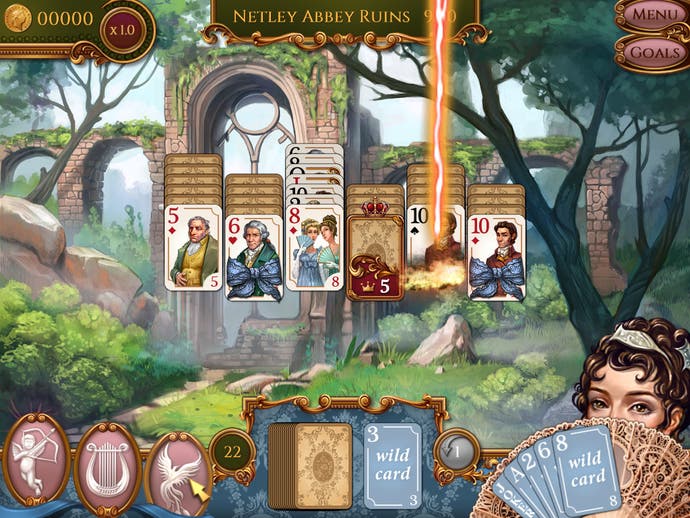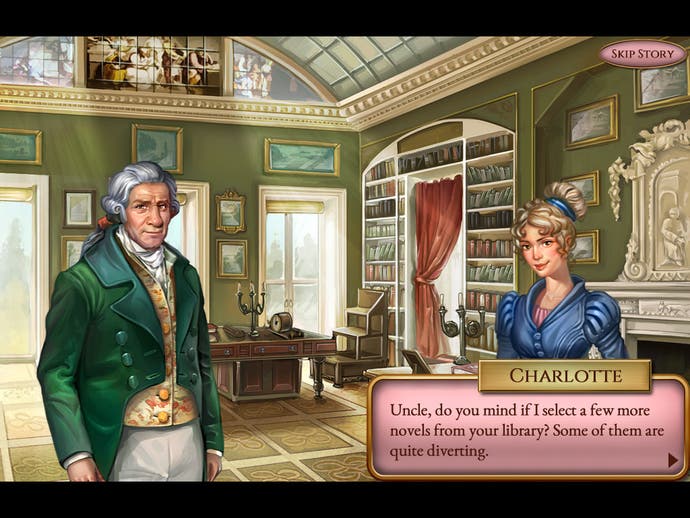Unsung games of 2015: Regency Solitaire
Austen maestro.
Confession time: I really love playing solitaire. I don't love it the way I love other games. I don't admire the cleverness of its design, I'm not particularly entertained by its mechanics. I love it with a deep, psychological need, an almost philosophical yearning. Of course I love clearing the cards when chance allows, enjoying the Pavlovian kick of tidying up at the core of so much gaming - but I also, in a perverse way, love it when chance allows me no such thing. It feels true. I need to be smart to win, but my loss might have been written in the cards from the start, which makes a win all the sweeter.
I learned the game from my Swiss grandmother on long, languorous and hot childhood holidays in the south of France, in the Klondike form that would later be popularised as a computer game when Microsoft included it with the Windows 3.0 operating system in 1990. Back then, I knew it by its British name patience, which seems even more apt. In French it is sometimes called réussite, "success", with what I assume to be withering irony, since the possibility of success is not guaranteed. It is fair but cruel, and with its 7000 trillion possible hands, it is mathematically inscrutable. Studies estimate that around 80% of Klondike hands are theoretically winnable, though the player's imperfect knowledge of the draw introduces a gambling element that leads to unwitting mistakes and drastically lowers the win rate. Just like life.
It is for these possibly masochistic reasons that in any given year, solitaire will be one of my most-played games - recently, in Brainium's iPhone version. This year, the video game world produced a couple of variations on it that distracted me for a while. Sage Solitaire, in which you clear cards by forming poker hands from a three-by-three grid, is nicely finished and an interesting thought experiment, though I reject the designer Zach Gage's position that solitaire's capricious mystery is a bug to be fixed. It ultimately left me cold.

Not so Regency Solitaire, a hypnotic plaything which takes the pastime of patience in a radically different direction. Developed by Grey Alien, it's a partly randomised, partly scripted puzzle game set within an amusingly arch narrative frame. In its playful, on-the-nose pastiche of the novels of Jane Austen, you are Bella, a young woman of marrying age from a financially struggling family on the fringes of polite society. You must evade the marital advances of the sinister Bleakley and pursue a better match - the dashing Mr Worthington - by holding a ball, but how to afford one? Why, by touring picturesque scenes in southern England playing solitaire for money, of course.
Solitaire with a story is an inherently ridiculous notion, but then much of this decorously frothy game turns the harsh old mistress on its head. It's quite easy, and I'm pretty sure it's engineered to always be solvable. Card suits are irrelevant, and to clear the layout you only need to run in either direction from the card on the pile, which is drawn a single card at a time. The fun comes from the layouts themselves - dozens of elaborate, curlicued designs, as befits the subject matter - and from the introduction of a number of video game mechanics: locked cards, recharging power-ups, meta goals, score multipliers for long runs, and so on.

The presentation is also hugely enjoyable. Regency Solitaire debuted on Steam back in May, but before that appeared on the venerable Big Fish casual games platform, and with its hand-painted cartoons, its shiny lettering, its mass-market frame of reference and its popping and chiming arcade sound effects, it's an aesthetic throwback to the mid-00s heyday of casual gaming - back when Pop-Cap was in its pomp and before smartphones came along and ruined everything. It even plays in 4:3 ratio, so it will look good on your grandma's old CRT monitor.
It's all so mannerly and soothing. Though the simple joy of clearing cards is the same, the context is as different from a game of Klondike as reading Austen is from real life. Perhaps that's why I enjoy both. One is artfully constructed, happy ending and all, the other a lesson in humility from the gods of chance. Of course you wouldn't be forced to lose a hand in Regency Solitaire - that would be as unthinkable an outcome as ending up in Bleakley's slimy clutches. Heaven forbid!









